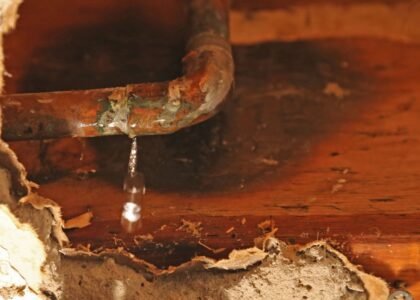Introduction
Water leaks can be sneaky. Hidden leaks—behind walls, under floors, inside ceilings—often go unnoticed until damage is extensive. Early detection can save money, protect your structure, and preserve indoor air quality. In this post, we’ll cover how to spot hidden leaks in your home or business, what tools and methods to use, and when professional leak detection services are needed.
Why Hidden Leaks Are a Big Deal
- Structural damage: Continuous moisture weakens beams, joists, drywall, and flooring.
- Mold & mildew growth: Even small leaks can create damp conditions that allow mold to thrive, leading to health risks.
- Utility bills: Leaks waste water—and water waste = added cost.
- Potential for escalating repair costs: What starts as a minor drip can lead to major pipe, flooring, or foundation repair.
Common Signs of Hidden Leaks
Even if you can’t see water, there are clues. Watch out for:
| Sign | What it might mean |
|---|---|
| Unusually high water bills without increased usage | Hidden water line leak or outlet running continuously |
| Discolored patches on walls, ceilings, or floors | Leak has been seeping into structural material |
| Musty or moldy smell in certain rooms | Moisture accumulation in hidden cavities |
| Peeling paint or wallpaper | Moisture behind walls |
| Warped flooring or floorboards that feel soft | Water under floor or in sub-flooring |
| Sounds of dripping, running water when fixtures are off | Internal leak in plumbing behind walls or under house |
Tools & DIY Methods for Leak Detection
Before calling in professionals, you can do some basic checks yourself. These won’t replace specialized equipment, but they help narrow the problem.
1. Check your water meter
- Turn off all water in and around the building (indoor & outdoor).
- Note the reading on your water meter. Wait 1–2 hours (no water usage).
- If the meter moves, there’s likely a leak somewhere in your plumbing or service line.
Springfield Water and Sewer Commission+2Miami-Dade County+2
2. Toilet test with food coloring
- Add a few drops of food coloring or a dye tablet to the tank of each toilet.
- Wait 10-20 minutes without flushing.
- If colored water appears in the bowl, the flush valve/flapper isn’t sealing properly.
lvvwd.com+1
3. Inspect faucets and showerheads
- Turn them off and listen for drips.
- Look under sinks for moisture, stain, or water damage.
- Sometimes simply tightening connections or replacing washers can stop leaks.
EPA+1
4. Look for outdoor clues
- Wet spots in yard/soil where there’s no irrigation.
- Unusual plant growth in one area.
- Cracks in pavement or concrete that stay damp.
Miami-Dade County+1
When to Call In Professionals
DIY checks are useful, but some leaks require advanced detection methods and professional experience. Consider professional help when:
- Leak signs are consistent but source is unknown (e.g., behind concrete, under slab, within walls).
- Leak is possibly underground (service line, foundation line).
- Leak involves high water pressure or large volumes—danger of extensive damage.
- You observe structural issues: sagging floors, ceiling collapse, widespread mold.
- You want permanent resolution and precise location.
→ For residents of Upland, CA and surrounding areas, a trusted service is Leak Detection by Pro Plumber Upland CA Company. You can view details about their leak detection services here.
→ To get more info or schedule service, visit their contact page.
Advanced Leak Detection Techniques
Professionals use specialized tools that make hidden leaks visible or traceable without invasive demolition:
- Electronic leak detection: Uses sensors/equipment that detect sound, moisture, or pressure changes inside pipes.
- Infrared / Thermal imaging: Detects temperature differences in walls, floors, ceilings to locate moisture or wet areas.
- Ultrasonic testing: Detects movement (sound) in pipes when water escapes.
- Smoke / gas tracer methods: In certain conditions, harmless gas or smoke is injected and observed escaping at leak points.
- Camera inspection: Sewer or pipe cameras can be fed into pipes or lines to see blockages, corrosion, or leaks.
These tools help minimize damage and pinpoint the exact location for repair.
Preventive Measures to Reduce Future Leak Risk
Once a leak is found and fixed, taking preventive steps helps to avoid recurrence:
- Regular plumbing inspections.
- Replace aging pipes (especially galvanized, lead, or corroded lines).
- Maintain stable indoor humidity to keep moisture levels safe.
- Use water-efficient fixtures and appliances.
- Know where the main shut-off valve is, and make sure it works properly.
- Avoid planting large trees close to water mains or lines (roots can damage pipes).
Summary
Hidden leaks are a serious risk—and catching them early can save a lot of trouble. Use DIY checks to spot warning signs, and when needed, call in professionals for accurate detection. For anyone around Upland, CA, Pro Plumber Upland CA Company provides leak detection services designed to locate and stop leaks before they escalate. Reach out via their leak detection service page or through the Contact Us page to see what might be going on with your plumbing.



